Creating a list of the top 10 NFL players of all time involves navigating through the league’s rich history, highlighting athletes who have not only showcased exceptional talent on the field but also significantly impacted the game. This endeavour requires a careful blend of statistical analysis, accolades, and the athletes’ influence on the sport. As such, the following list represents a curated selection of players based on these criteria, acknowledging that opinions on this topic can vary widely among fans and experts.
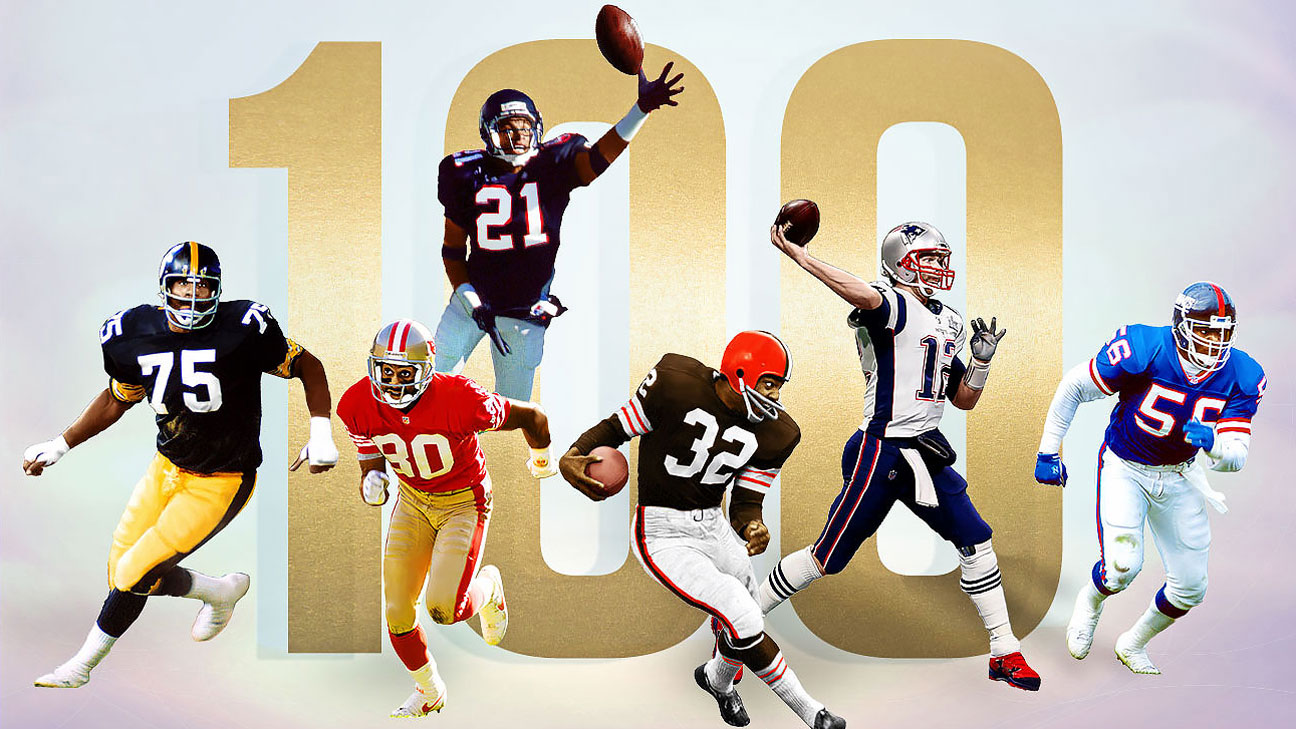
Top 10 NFL Players of All Time
1. Jerry Rice – Often heralded as the greatest wide receiver in NFL history, Rice holds numerous records, including most receptions, touchdown receptions, and receiving yards.
2. Jim Brown – A dominant running back, Brown led the league in rushing yards in eight out of his nine seasons, setting a high bar for excellence and durability.
3. Lawrence Taylor – Revolutionized the linebacker position; Taylor’s aggressive play and ability to disrupt the offense made him a defensive force throughout his career.
4. Tom Brady – With a record number of Super Bowl victories as a quarterback, Brady’s leadership, longevity, and performance under pressure are unparalleled.
5. Walter Payton – Known for his versatility and relentless work ethic, Payton’s all-around abilities as a running back set him apart.
6. Joe Montana – A key figure in the 49ers’ dynasty, Montana’s precision passing and performance in critical moments earned him a place among the greats.
7. Reggie White – One of the most dominant defensive players, White’s ability to sack the quarterback and his leadership both on and off the field were instrumental to his teams.
8. Peyton Manning – Renowned for his football intellect and ability to orchestrate an offense, Manning’s numerous MVP awards attest to his impact on the game.
9. Barry Sanders – Sanders’ elusive running style and ability to make miraculous plays out of seemingly nothing left fans and defenders in awe.
10. Dick Butkus – Epitomizing the tough, gritty nature of football, Butkus was feared for his aggressive play and is often cited as one of the most intimidating linebackers in NFL history.
1. Jerry Rice: The Greatest Wide Receiver in NFL History
Jerry Rice‘s career is a testament to hard work, dedication, and an unyielding desire to improve. Born in Starkville, Mississippi, in 1962, Rice’s journey to NFL stardom was fueled by his determination to prove himself at every turn. Attending Mississippi Valley State University, he set the college football world ablaze with his performance, which would be a precursor to his NFL success.
Drafted by the San Francisco 49ers in the first round of the 1985 NFL Draft, Rice quickly made an impression in the league. Over his 20-season career, he would go on to break numerous records, many of which still stand today. His 1,549 career receptions, 22,895 receiving yards, and 197 receiving touchdowns are marks that speak to his longevity and productivity.
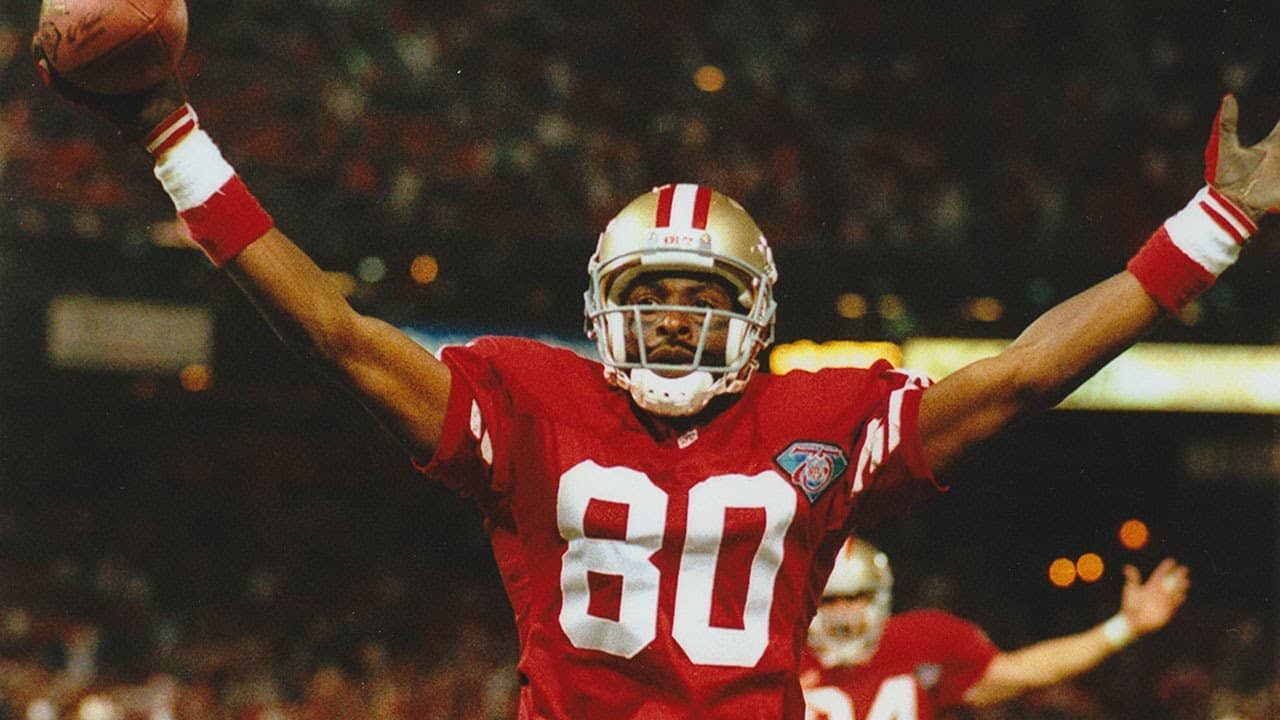
Rice’s impact extended beyond the numbers. His work ethic, route-running precision, and hands were legendary. He was a key component of the 49ers’ success, contributing to three Super Bowl victories. His ability to perform in crucial moments, including a Super Bowl XXIII performance that earned him MVP honors, showcased his talent and determination.
Jerry Rice’s legacy is not just in the records he holds but in the way he played the game. He was a leader on and off the field, pushing his teammates to strive for excellence. His influence extends to generations of wide receivers who see him as the pinnacle of achievement at the position.

In discussing the greatest NFL players of all time, Rice’s name is often the first to come up, not only because of his statistical dominance but because of how he elevated the game. His career exemplifies what it means to be a professional athlete: talent, hard work, resilience, and an insatiable desire to be the best. Jerry Rice is not just a phenomenal wide receiver; he is an enduring icon of American football.
2. Jim Brown: A Legacy Beyond the Gridiron
Jim Brown’s career in the NFL, though spanning just nine seasons, left an indelible mark on the sport and established him as one of the greatest running backs of all time. Born on February 17, 1936, in St. Simons Island, Georgia, Brown excelled in multiple sports during his college years at Syracuse University. Still, it was on the football field where his combination of size, speed, and power was truly transformative.
Selected by the Cleveland Browns in the first round of the 1957 NFL Draft, Brown wasted no time asserting his dominance. He led the league in rushing yards as a rookie, a feat he would achieve eight times during his nine-season career. Brown’s 12,312 rushing yards and 106 touchdowns were records at the time of his retirement and remain among the best in NFL history.
Beyond his statistical achievements, Brown’s style of play redefined the running back position. His ability to break tackles and gain extra yards after contact was unmatched. Brown possessed a unique blend of power and agility, coupled with an unparalleled competitive spirit, making him nearly unstoppable on the field.
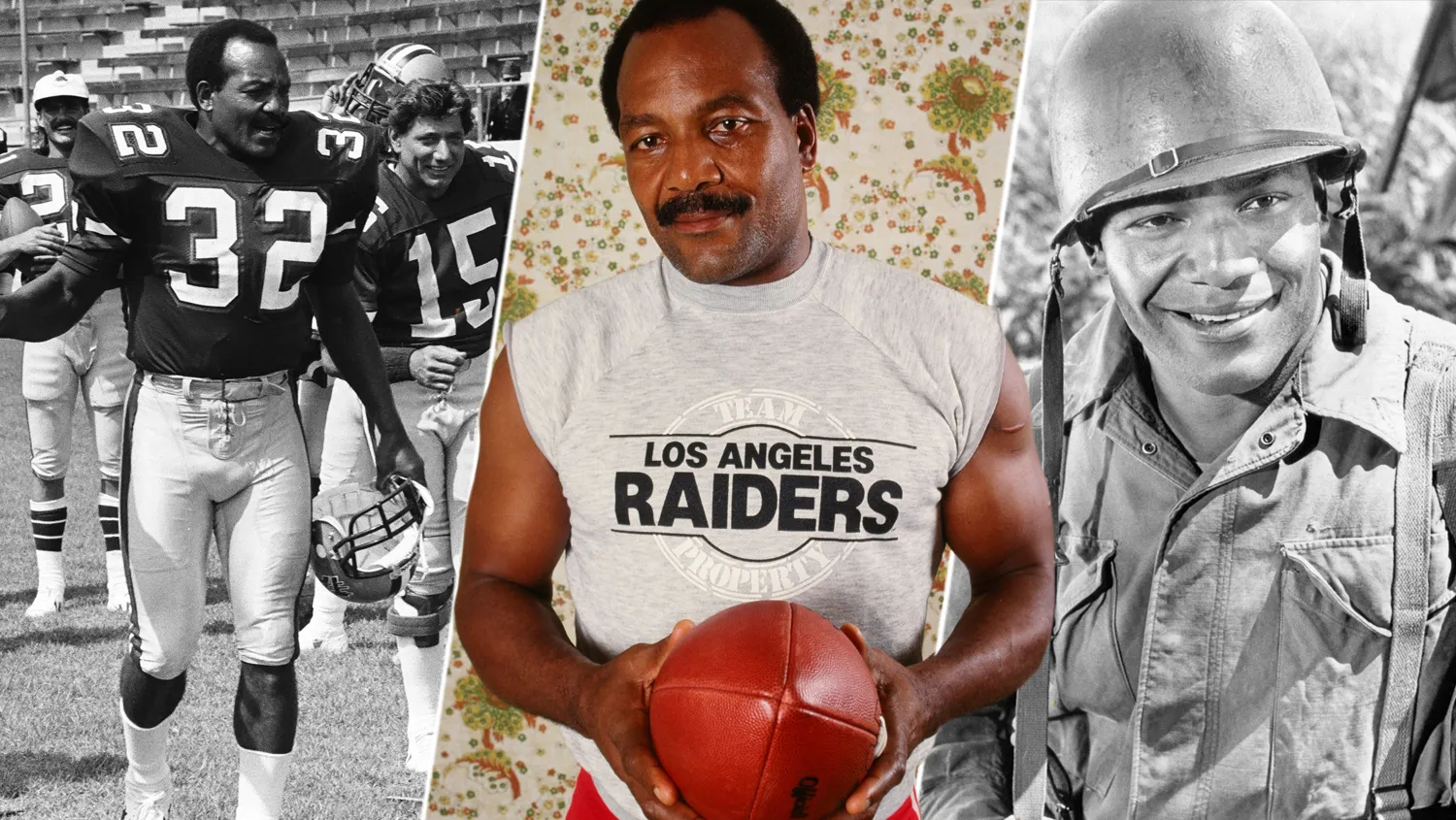
Brown’s impact was not confined to his on-field performance. He became an influential figure off the field, actively involved in civil rights and social justice issues. After retiring at the peak of his career to pursue acting and activism, Brown continued to influence generations, not only as a football legend but also as a social advocate.
Jim Brown’s legacy is multifaceted. In the realm of football, he is remembered as a player who could dominate a game like no other, setting a standard for excellence that future generations would aspire to. Off the field, his commitment to social change and community engagement highlighted his role as a leader and pioneer. Brown’s life and career offer a compelling narrative of excellence, resilience, and the relentless pursuit of equality and justice.

Jim Brown stands as a towering figure in the annals of NFL history, not just for the yards he gained or the touchdowns he scored, but for the way he played the game and the principles he stood by. His legacy is a testament to the idea that greatness transcends the field of play, echoing through the lives he touched and the causes he championed.
3. Lawrence Taylor: Redefining Defensive Excellence
Lawrence Taylor, often referred to by his initials, LT, is widely regarded as one of the most dominant and intimidating linebackers in NFL history. Born on February 4, 1959, in Williamsburg, Virginia, Taylor brought an unprecedented combination of speed, strength, and aggression to the linebacker position, forever altering how defense was played in the National Football League.
Drafted by the New York Giants in 1981 as the second overall pick, Taylor made an immediate impact in the league, earning Defensive Rookie of the Year and Defensive Player of the Year honors—a feat never before accomplished in the same year. Throughout his 13-year career, all of which he spent with the Giants, Taylor was a relentless force, accruing 132.5 official sacks (sacks became an official statistic in 1982, Taylor’s second season), forcing numerous turnovers, and instilling fear in the hearts of opposing quarterbacks.
Taylor’s playing style was characterized by his explosive speed and power, which he used to elude or overpower blockers, and his uncanny ability to diagnose plays and react with unmatched quickness. He was the cornerstone of the Giants’ defense and played a crucial role in the team’s two Super Bowl victories during his tenure. His influence was so profound that offensive coaches across the league had to innovate new schemes and strategies specifically to counter his disruptive presence.
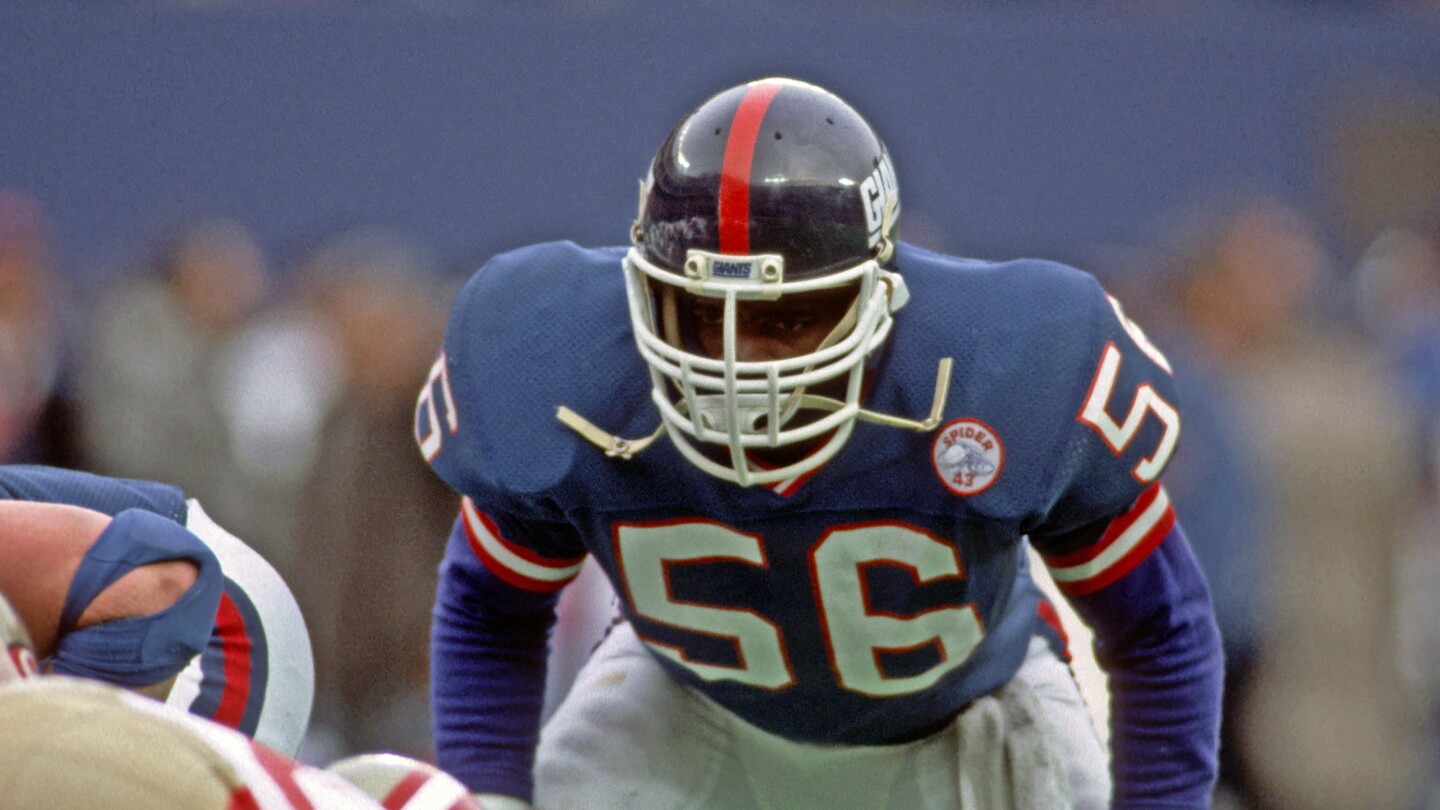
Off the field, Taylor’s career was not without controversy, including struggles with substance abuse and legal issues. However, his contributions to the game and his sheer dominance on the field have cemented his legacy as one of the greatest defensive players in the history of the sport.
Taylor was not just a player; he was a phenomenon that changed the way defense was played in the NFL. Before Taylor, the linebacker position did not typically command the spotlight as a source of game-changing plays. Taylor’s success led teams to seek out dynamic and versatile linebackers who could impact the game in a variety of ways, mirroring his ability to rush the passer, defend the run, and cover receivers.
Lawrence Taylor’s legacy is defined by his extraordinary talent, his impact on the game’s strategy, and his role in transforming the linebacker position into one of the most critical on the defensive side of the ball. His awards and accolades, including 10 Pro Bowl appearances, 8 First-team All-Pro selections, and 2 Super Bowl championships, only partially capture the significance of his contribution to the NFL. Taylor’s influence persists in the way defense is played and how defensive players are evaluated and utilized in modern football.

Taylor’s career serves as a testament to the transformative power of exceptional talent and innovation. Despite the challenges and controversies, Lawrence Taylor remains a towering figure in NFL history, a player whose legacy continues to influence the game long after his retirement.
4. Walter Payton: The Embodiment of Greatness and Grace
Walter Payton, affectionately known as “Sweetness” for his smooth playing style and engaging personality, is universally celebrated as one of the greatest running backs in NFL history. Born on July 25, 1954, in Columbia, Mississippi, Payton’s journey to NFL stardom began at Jackson State University, where he distinguished himself as a formidable force in college football.
Selected by the Chicago Bears with the fourth overall pick in the 1975 NFL Draft, Payton’s impact on the league and the running back position was both immediate and lasting. Over his 13-season career, all with the Bears, he accumulated a then-record 16,726 rushing yards, a testament to his durability and consistent excellence. Payton’s 110 rushing touchdowns, coupled with his proficiency in receiving and even passing, showcased his versatility and all-around skill set.
Beyond his impressive statistics, Walter Payton’s legacy is defined by his remarkable character, resilience, and humanitarian efforts. On the field, he was known for his never-die-easy running style, punishing defenders with his stiff arm, and his extraordinary ability to gain yards after contact. Off the field, Payton’s philanthropic work, particularly with the Walter and Connie Payton Foundation, highlighted his commitment to giving back to the community and supporting various charitable causes.
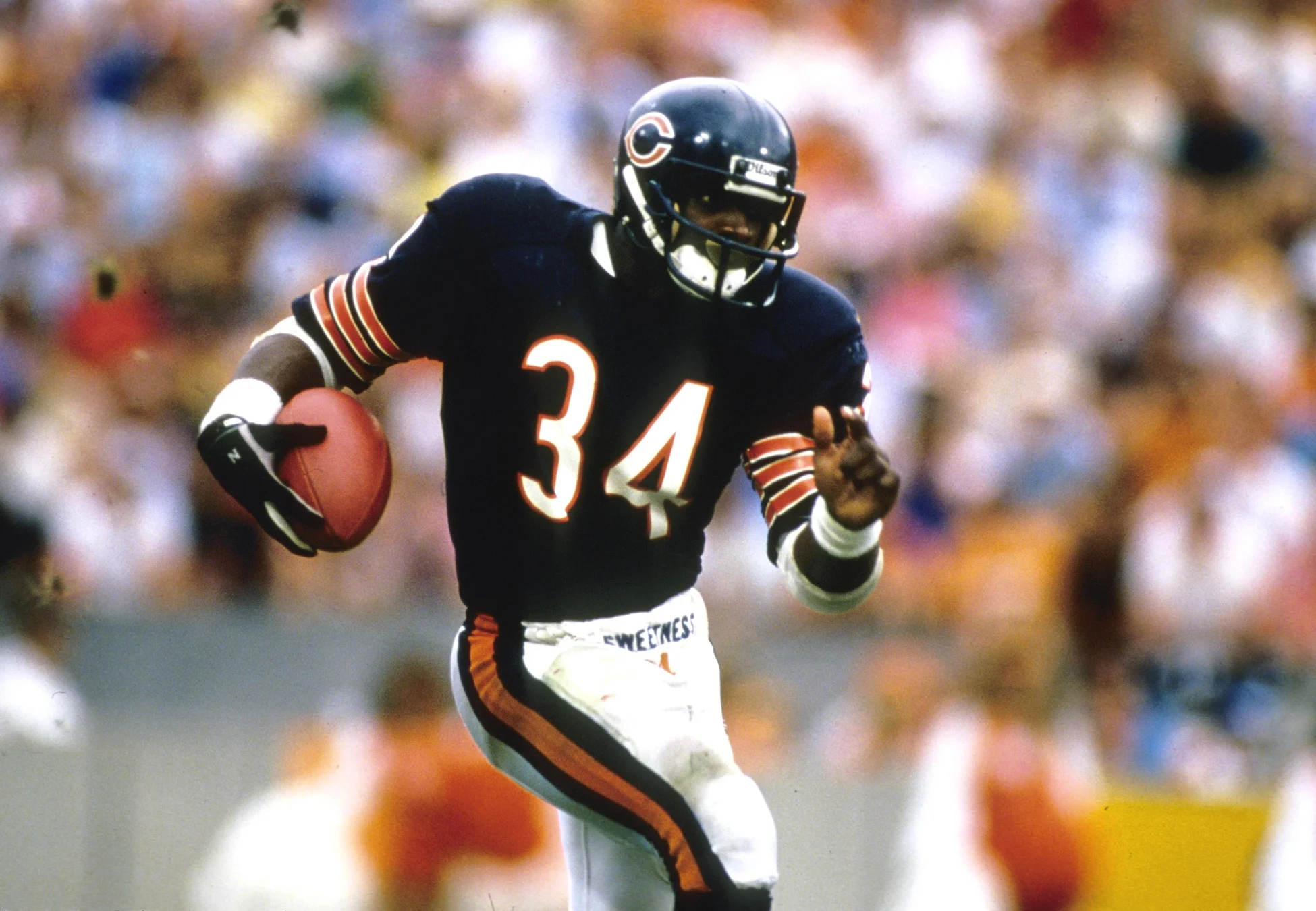
Payton’s influence extended beyond individual accolades, including the 1977 MVP award and a Super Bowl XX victory. He was a leader in the locker room and a mentor to younger players, embodying the ethos of professionalism, hard work, and respect for the game. His training regimen and dedication to excellence set a standard for future generations of athletes.
Walter Payton’s untimely death in 1999 from a rare liver disease was a profound loss to the sports world and the many lives he touched. In honor of his legacy, the NFL renamed its Man of the Year Award to the Walter Payton NFL Man of the Year Award, recognizing players who exemplify excellence on and off the field.
Payton’s career remains a beacon of greatness, not only for his athletic prowess but also for his spirit, grace, and impact on society. Walter Payton’s story is one of triumph, inspiration, and an enduring legacy that transcends the boundaries of sport.
5. Joe Montana: Master of the Comeback and the Cool
Joe Montana, known as “Joe Cool” for his calm demeanor under pressure, is often celebrated as one of the greatest quarterbacks in NFL history. Born on June 11, 1956, in New Eagle, Pennsylvania, Montana’s path to NFL legend status began at the University of Notre Dame, where he led the Fighting Irish to a national championship in 1977.
Drafted by the San Francisco 49ers in the third round of the 1979 NFL Draft, Montana would become the cornerstone of the team’s dynasty in the 1980s. Throughout his 16-year career, with the majority spent in San Francisco before concluding with the Kansas City Chiefs, Montana’s leadership, precision passing, and clutch performances, particularly in the postseason, distinguished him as a true icon of the sport.
Montana’s resume includes four Super Bowl titles, three Super Bowl MVP awards, and eight Pro Bowl selections, underscoring his excellence and impact on the game. Perhaps most memorable are his come-from-behind victories, none more iconic than the 92-yard drive culminating in a touchdown pass to Dwight Clark, known as “The Catch,” in the 1981 NFC Championship Game against the Dallas Cowboys.
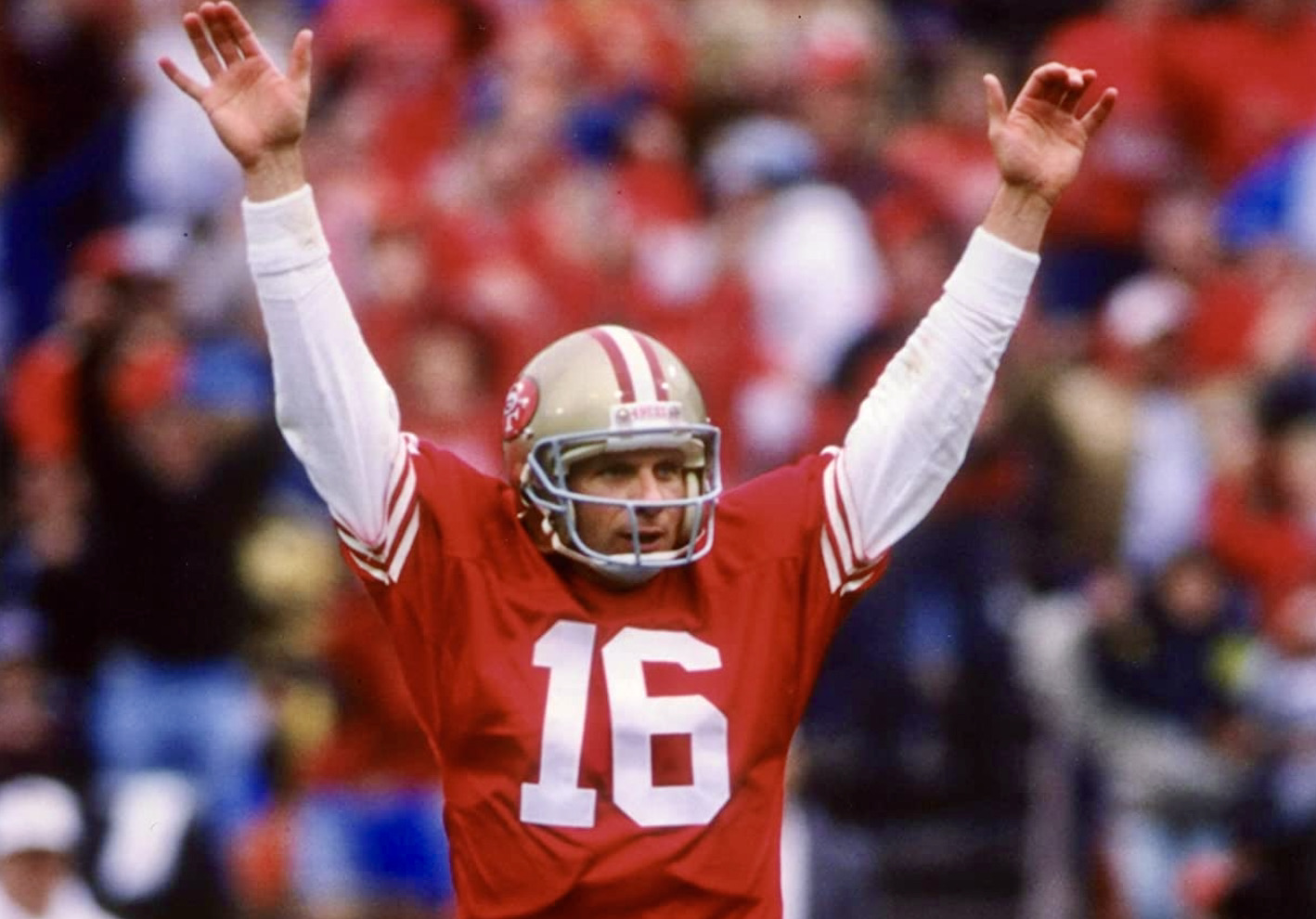
Montana’s ability to maintain his composure in high-stakes situations, earning him the moniker “Joe Cool,” was matched by his technical proficiency and understanding of the game. His partnership with head coach Bill Walsh was instrumental in popularizing the West Coast offense, a strategy that emphasized short, precise passing to control the ball and the clock.
Off the field, Montana was known for his quiet confidence and dedication to the sport. He was not the most physically imposing player, but his mental acuity, preparation, and understanding of his opponents made him a formidable force. Montana’s career serves as a testament to the idea that leadership and intelligence are as critical to football success as physical talent.
In retirement, Montana’s legacy continues to influence the game, serving as a benchmark for quarterback excellence. His career highlights the importance of resilience, teamwork, and the relentless pursuit of greatness, principles that resonate beyond football.
Joe Montana’s story is not just about the triumphs and the accolades but also about the journey, the challenges overcome, and the moments of magic that define the essence of sport. His legacy is etched not only in the record books but in the hearts of fans who witnessed his mastery of the comeback and the cool.

The exploration of these legendary NFL players illuminates the diverse attributes that contribute to greatness in football, from the physical and technical prowess of a running back or wide receiver to the strategic and leadership qualities of a quarterback. Each player’s story adds a unique thread to the rich narrative tapestry of the NFL, celebrating the individuals whose talents and achievements have elevated the game.
6. Reggie White: The Minister of Defense
Reggie White, known as “The Minister of Defense” for his devout Christian faith and his unparalleled skill on the football field, stands among the most dominant defensive linemen in NFL history. Born on December 19, 1961, in Chattanooga, Tennessee, White’s journey to NFL stardom began at the University of Tennessee, where he established himself as a formidable force against the opposition.
White’s professional career commenced in the United States Football League (USFL) with the Memphis Showboats, but it was his subsequent tenure in the NFL, notably with the Philadelphia Eagles and the Green Bay Packers, that cemented his legacy. Over a distinguished 15-year career, White accumulated a then-record 198 sacks, a testament to his relentless pursuit of quarterbacks and his ability to disrupt even the best-laid offensive plans.
White’s impact on the game was profound. His combination of size, speed, and technique made him nearly unblockable, altering offensive strategies and demanding constant attention. Yet, it was his leadership and character that left an indelible mark on teammates and rivals alike. Off the field, White’s commitment to his faith and his community involvement spoke to a man who viewed football as a platform for broader impact.
Reggie White was instrumental in the Packers’ victory in Super Bowl XXXI, demonstrating his leadership and playing prowess when it mattered most. His honours, including 13 Pro Bowl selections and 2 NFL Defensive Player of the Year awards, barely scratch the surface of his influence within the sport.
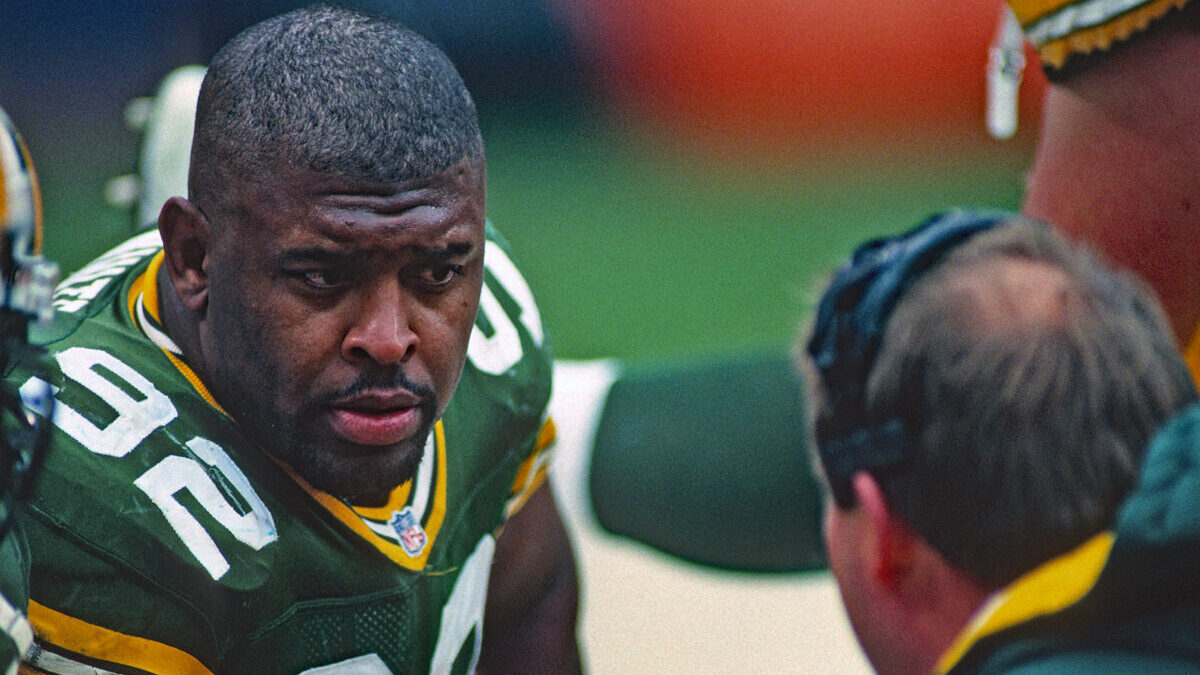
White’s passing in 2004 at the age of 43 was a profound loss to the football community and those who knew him. In recognition of his legacy, the NFL community continues to celebrate his contributions to the game and society. The Reggie White Award, given to the defensive lineman who best exemplifies outstanding character and leadership in the home, on the field, and in the community, ensures that his spirit lives on.
Reggie White’s career is a testament to the idea that greatness is achieved not only through individual performance but also through the ability to inspire and elevate those around you. His legacy as one of the greatest defensive players in NFL history is matched by his enduring impact as a role model and leader.

The narrative of NFL legends we’ve explored showcases the diverse ways in which greatness manifests in professional football. From the grace and resilience of a running back like Walter Payton to the strategic genius and leadership of a quarterback like Joe Montana and the dominating presence of a defensive lineman like Reggie White, each story contributes to the rich tapestry of the NFL’s history.
7. Peyton Manning: The Architect of the Game
Peyton Manning, often celebrated for his unparalleled understanding of football, transformed the quarterback position into a cerebral art form. Born on March 24, 1976, in New Orleans, Louisiana, Manning’s journey to NFL stardom was seemingly predestined, growing up in a family where football was a way of life. His collegiate career at the University of Tennessee set the stage for what would become one of the most illustrious careers in NFL history.
Selected by the Indianapolis Colts as the first overall pick in the 1998 NFL Draft, Manning’s impact on the team and the league was immediate and profound. Over his 18-season career, split between the Colts and the Denver Broncos, Manning amassed numerous records, including most career touchdown passes and passing yards at the time of his retirement. His five MVP awards stand as a testament to his dominance and consistency.
What set Manning apart was not just his statistical achievements but his approach to the game. Known as “The Sheriff,” his ability to read defenses and make adjustments at the line of scrimmage before the snap revolutionized the quarterback position. Manning’s meticulous preparation, football IQ, and leadership transformed the offenses of both the Colts and the Broncos into some of the most formidable units in the league.
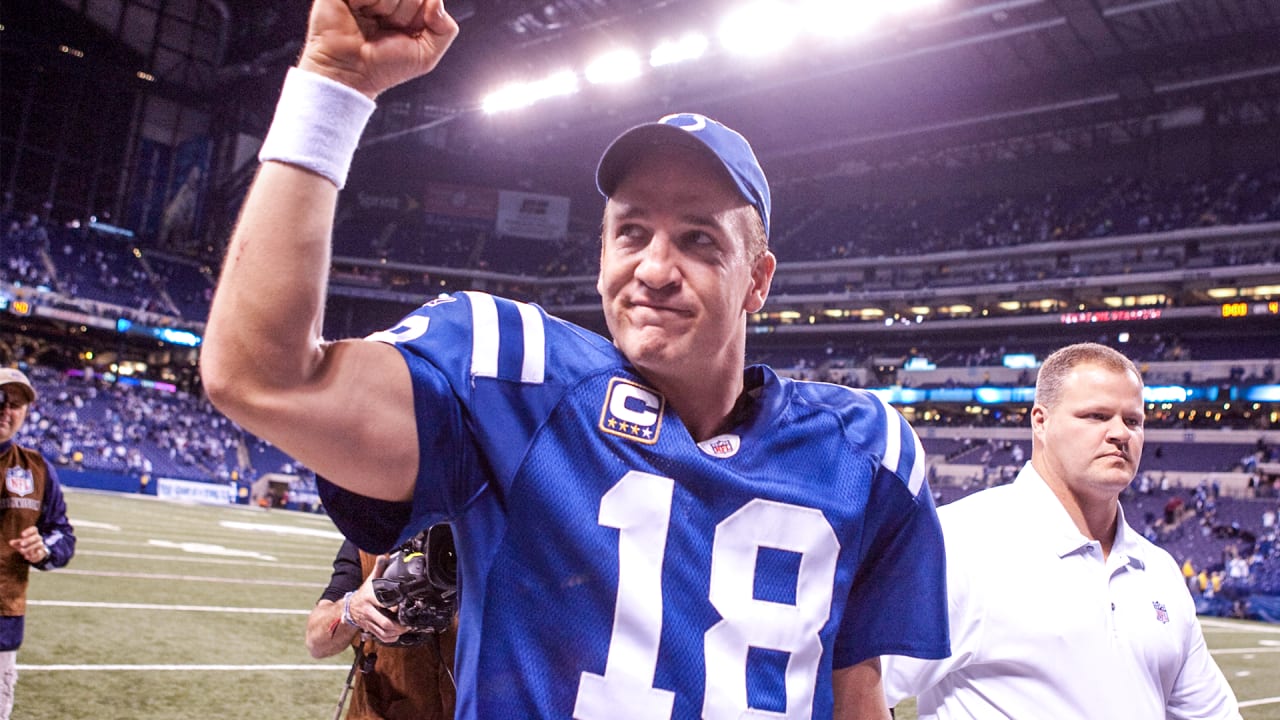
Manning led his teams to two Super Bowl victories, first with the Colts in Super Bowl XLI and then with the Broncos in Super Bowl 50, becoming the first starting quarterback to win Super Bowls with two different teams. These accomplishments highlight not only his talent but also his ability to elevate the performance of those around him.
Off the field, Manning’s affable personality and sharp wit made him a beloved figure in popular culture, transcending the sport of football. His contributions to the game, however, extend beyond his playing days. Through his charity work with the Peyback Foundation, Manning has impacted the lives of countless children and families, showcasing his commitment to giving back to the community.
Peyton Manning’s legacy in the NFL is that of a trailblazer who changed how the quarterback position is played and perceived. His induction into the Pro Football Hall of Fame in 2021 was a fitting tribute to a career defined by excellence, innovation, and leadership. Manning’s story is not just about the records he set or the championships he won but about the indelible mark he left on the sport, reshaping it for future generations.

Exploring the careers of these NFL legends offers insights into the qualities that define greatness in the sport: talent, determination, innovation, leadership, and the ability to inspire others. As we continue this journey through the top 10 NFL players of all time, each player’s story adds a unique layer to the understanding of what it takes to achieve and sustain excellence in the highly competitive world of professional football.
8. Barry Sanders: A Symphony of Elusiveness
Barry Sanders, celebrated for his jaw-dropping agility and elusive running style, redefined what it meant to be a running back in the NFL. Born on July 16, 1968, in Wichita, Kansas, Sanders’ football journey took a definitive turn at Oklahoma State University, where he set the college football world alight with his record-breaking 1988 season, securing the Heisman Trophy in a landslide victory.
Drafted by the Detroit Lions with the third overall pick in the 1989 NFL Draft, Sanders’ impact was immediate and electrifying. Over his 10-season career—all with the Lions—Sanders amassed 15,269 rushing yards, ranking him among the NFL’s all-time rushing leaders. His 1997 season, in which he rushed for 2,053 yards, remains one of the most remarkable individual campaigns in league history.
Sanders’ playing style was nothing short of mesmerizing. His ability to change direction almost instantaneously, combined with his vision and balance, made him nearly impossible to tackle. Sanders turned runs that seemed destined for losses into spectacular gains, leaving defenders grasping at air and fans in awe. Despite his brilliance, Sanders’ humility and team-first attitude were hallmarks of his character.
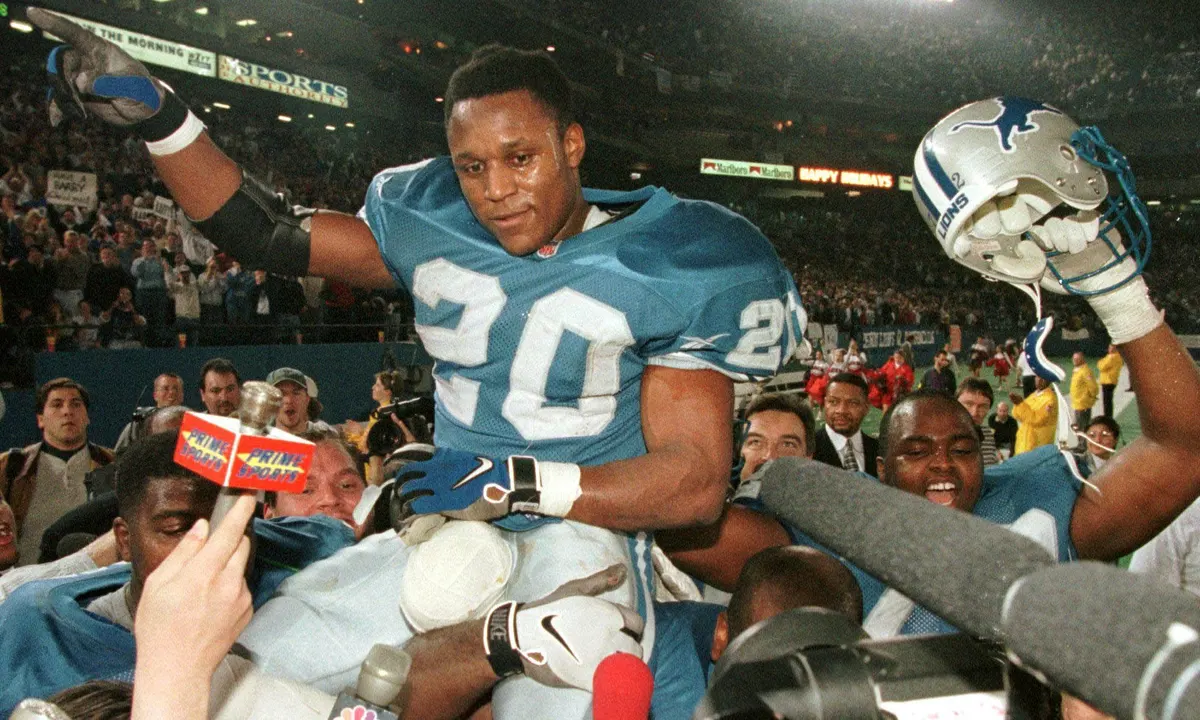
However, Sanders’ career was also marked by its sudden end. At the height of his powers, he abruptly retired from the NFL just before the 1999 season, leaving many to wonder what more he could have achieved. His decision, rooted in a desire for a life beyond football and dissatisfaction with the Lions’ direction, sparked widespread speculation and debate.
Barry Sanders’ legacy transcends his on-field achievements. He inspired a generation of running backs with his style and approach to the game. His reluctance to celebrate touchdowns, preferring instead to hand the ball to the referee, epitomized his understated demeanor and respect for the game.
In retirement, Sanders has remained an influential figure in the NFL community, involved in various charitable efforts and serving as an ambassador for the sport. His induction into the Pro Football Hall of Fame in 2004 was a testament to his incredible career and the impact he had on the game.
Barry Sanders’ story is a compelling narrative of brilliance, humility, and the pursuit of personal fulfillment. His legacy is not defined merely by the yards he gained or the defenders he evaded. Still, by the way he played the game—with a blend of grace, respect, and unparalleled talent that continues to resonate with football fans and players alike.

The exploration of NFL greatness through the stories of these legendary players highlights a rich tapestry of talent, dedication, and impact that extends beyond the field. As we continue this journey, reflecting on the achievements and contributions of each player, we gain a deeper appreciation for the complexity and beauty of the game of football.
9. Dick Butkus: The Quintessence of Defensive Ferocity
Dick Butkus, whose name has become synonymous with defensive prowess in the National Football League (NFL), embodied the essence of toughness and intensity on the football field. Born on December 9, 1942, in Chicago, Illinois, Butkus carved a niche for himself as one of the most feared and respected linebackers in the history of the game. His journey to NFL stardom began at the University of Illinois, where he established himself as a force to be reckoned with, earning unanimous All-American honors.
Drafted by his hometown team, the Chicago Bears, with the third overall pick in the 1965 NFL Draft, Butkus quickly became the heart and soul of the Bears’ defense. Over his illustrious nine-season career, all spent with the Bears, Butkus became known for his fierce playing style, exceptional football instincts, and relentless pursuit of the ball carrier. His ability to disrupt the offense, whether through bone-crushing tackles, forced fumbles, or interceptions, set a new standard for middle linebackers.
Butkus’ impact on the field was immense. He was an eight-time Pro Bowl selectee, a six-time First-team All-Pro, and twice named the NFL Defensive Player of the Year. Despite playing on teams that often struggled to find success, Butkus’ brilliance and leadership were undeniable. His passion for the game and fierce competitiveness made him a beloved figure among Bears fans and a respected adversary across the league.
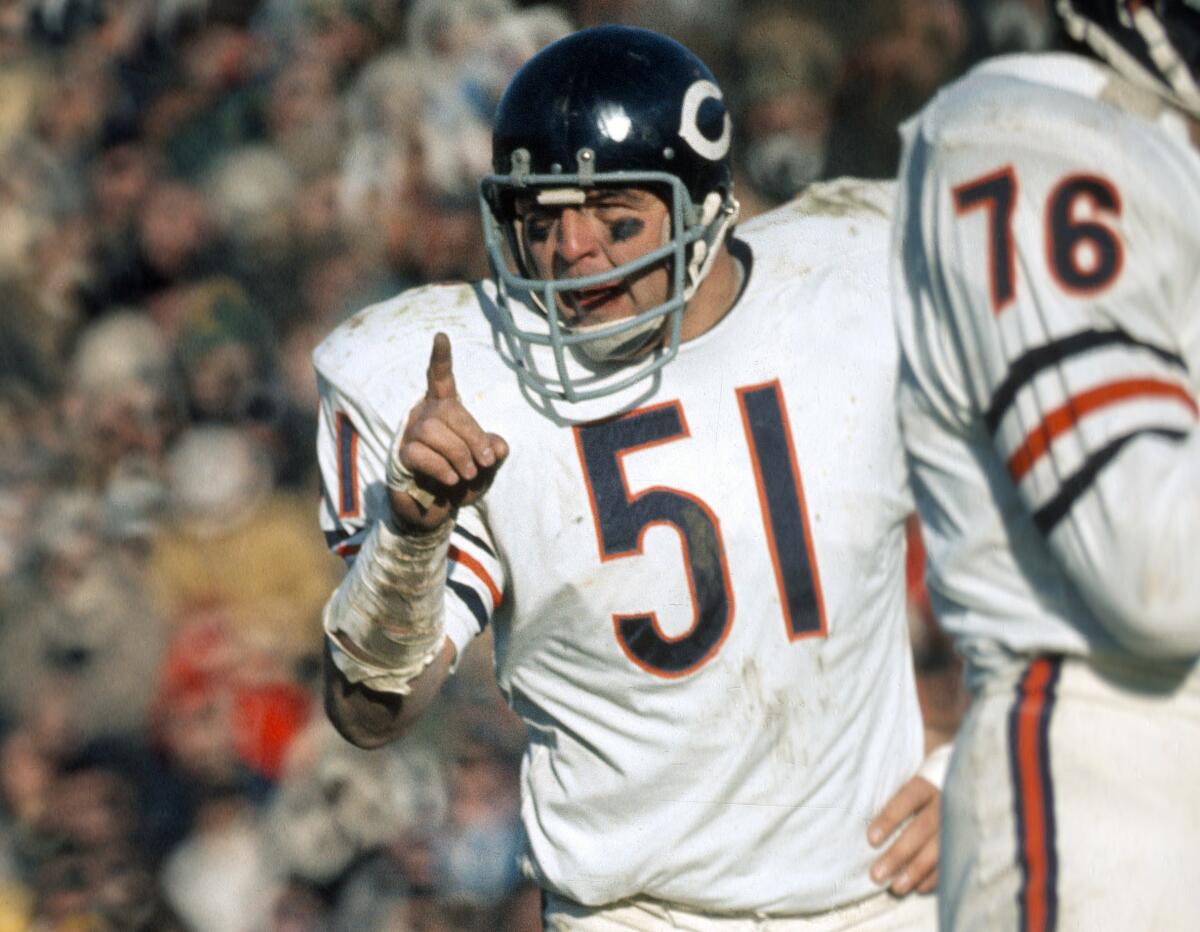
Off the field, Butkus’ persona was equally formidable. His dedication to the game, rigorous training regimen, and commitment to excellence inspired teammates and future generations of linebackers. Butkus was not just a player; he was an icon of the sport, embodying the spirit and toughness of football.
However, Butkus’ career was not without its challenges. His playing days were cut short by knee injuries, leading to his premature retirement at the age of 31. Despite the brevity of his career, Butkus left an indelible mark on the NFL, redefining the linebacker position and setting a benchmark for defensive excellence.
In retirement, Butkus has continued contributing to the sport, including efforts to promote player health and safety. His legacy is also preserved through the Butkus Award, which is presented annually to the top linebackers at the high school, college, and professional levels, celebrating those who best embody the spirit and performance of Butkus himself.

Dick Butkus’ story is a testament to the impact a single player can have on the game of football. His name is etched not only in the record books but also in the lore of the NFL as a symbol of toughness, excellence, and the relentless pursuit of greatness.
10. Tom Brady: A Legacy of Excellence and Unmatched Success
Tom Brady‘s illustrious NFL career is a testament to unparalleled leadership, longevity, and an unmatched ability to perform under pressure. Born on August 3, 1977, in San Mateo, California, Brady’s journey from a sixth-round draft pick in the 2000 NFL Draft to becoming the most successful quarterback in league history is a story of perseverance, dedication, and an unwavering desire to win.
Brady spent two decades with the New England Patriots, where he and head coach Bill Belichick formed one of the most successful partnerships in sports history. Together, they reached nine Super Bowls, winning six, making Brady the player with the most Super Bowl victories in NFL history. His tenure with the Patriots was marked by an era of dominance that included 17 division titles and numerous NFL records.
In 2020, Brady took on a new challenge with the Tampa Bay Buccaneers, further cementing his legacy by leading the team to victory in Super Bowl LV at the age of 43. This victory not only underscored his timeless skill and competitiveness but also made him the first quarterback to win Super Bowls with two different franchises.
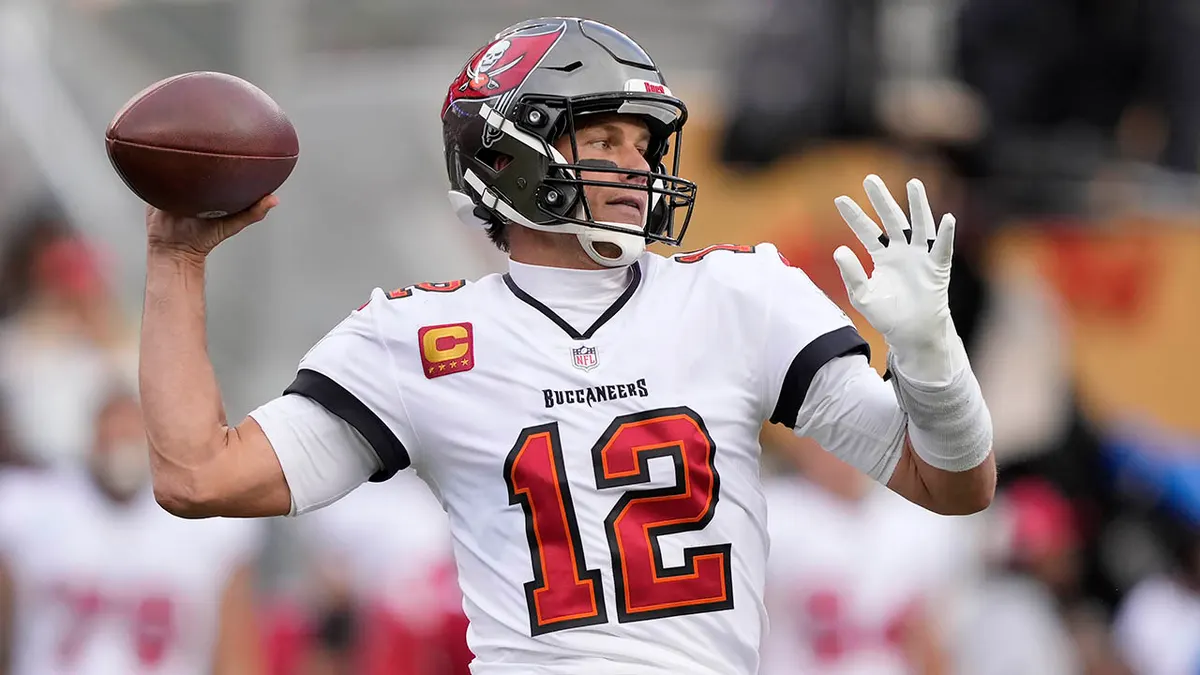
Brady’s career statistics are staggering, including numerous league MVP awards and Pro Bowl selections, all of which are complemented by his record for the most career touchdown passes and passing yards. However, beyond the numbers, Brady’s impact on the game is defined by his clutch performances in critical moments, often leading his team to victory from seemingly insurmountable deficits.
Off the field, Brady is known for his meticulous approach to training and nutrition, which has contributed to his longevity and performance levels. His TB12 method has inspired athletes across sports to prioritize holistic well-being for sustained success.

Tom Brady’s career is a blueprint of excellence, showcasing what is possible with hard work, determination, and a relentless pursuit of greatness. As he continues to defy the limitations of age, Brady’s legacy as one of the greatest athletes in the history of professional sports is secure, a legacy built on victories, records, and an inspirational journey from underdog to NFL legend.
In Conclusion,
The exploration of these top NFL players reveals the diverse talents and remarkable achievements that define greatness in professional football. From the artistry of a running back like Barry Sanders to the strategic mastery of a quarterback like Peyton Manning and the sheer defensive dominance of a linebacker like Dick Butkus, each player’s legacy contributes to the rich history and enduring appeal of the NFL.
As we conclude this journey through the lives and careers of the top 10 NFL players of all time, we are reminded of the passion, dedication, and spirit that fuel the pursuit of excellence on and off the field. These legends not only shaped the game of football but also left an indelible mark on the hearts of fans and aspiring players everywhere.
With the narratives of these extraordinary athletes as our guide, we gain a deeper understanding and appreciation for the complexities, challenges, and triumphs of professional football. Their stories are a testament to the enduring power of sport to inspire, entertain, and unite us in the shared experience of human achievement.









